

Information Prescriptions: Tools To Support Students’ Library Skills. Primary Source Analysis Tool. Choice Literacy - Articles & Videos - Full Article. Research in fifth grade can be mind-numbing. Add note taking into that equation and you are in for an exhausting unit. Note taking in the world of fifth graders is always tricky. Research Process Models. We know from decades of studies that when people do research, they follow a process with some predictable stages.
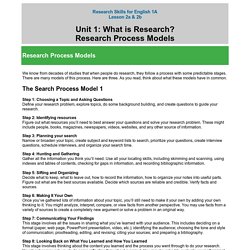
There are many models of this process. Here are three. As you read, think about what these models have in common. The Search Process Model 1 Step 1: Choosing a Topic and Asking Questions Define your research problem, explore topics, do some background building, and create questions to guide your research. Step 2: Identifying resources Figure out what resources you’ll need to best answer your questions and solve your research problem. Step 3: Planning your search Narrow or broaden your topic, create subject and keyword lists to search, prioritize your questions, create interview questions, schedule interviews, and organize your search time. Information Search Process. Enter into the Research. A MiddleWeb Blog “Do you always do this research project?”
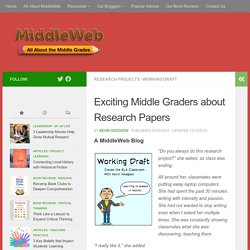
She asked, as class was ending. All around her, classmates were putting away laptop computers. She had spent the past 30 minutes writing with intensity and passion. She had not wanted to stop writing even when I asked her multiple times. Evaluating Sources: The CRAAP Test. The CRAAP Test helps you evaluate sources to determine whether or no they are appropriate for an academic assignment When was the information published or posted? Conducting Effective Internet Research. There has been a great deal of buzz about research-based writing lately, in no small part because of its emphasis in the Common Core Standards.
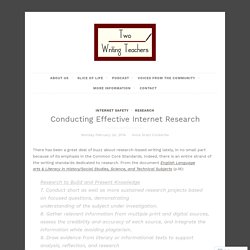
Indeed, there is an entire strand of the writing standards dedicated to research. From the document English Language arts & Literacy in History/Social Studies, Science, and Technical Subjects (p.18): Research to Build and Present Knowledge 7. Conduct short as well as more sustained research projects based on focused questions, demonstrating understanding of the subject under investigation. 8. Gather relevant information from multiple print and digital sources, assess the credibility and accuracy of each source, and integrate the information while avoiding plagiarism. 9. Research-based writing is quite challenging in that it requires complex reading skills. There is, of course, one HUGE thing that has changed about research-based writing: the Internet. Bookmark appropriate search engines.
Building Good Search Skills: What Students Need to Know. Teach Students to Ask Their Own Questions. This process explicitly validates all students’ intellectual abilities.– High School History Teacher, New York The reasons behind their questions often bowl me over with their sincerity, the fact that [they] really want to know the answers because it’s important to them, or they feel it would be important for others to know.– 4th Grade Teacher, Chicago The ability to produce questions, improve questions and prioritize questions may be one of the most important—yet too often overlooked—skills that a student can acquire in their formal education.
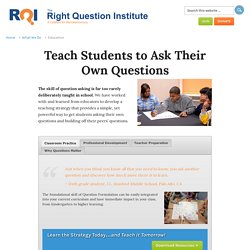
Strong critical thinking is often grounded in the questions we ask. By deliberately teaching questioning skills, we will be facilitating a process that will help students develop a mental muscle necessary for deeper learning, creativity and innovation, analysis, and problem solving. Join the Movement: Make Question Formulation a part of Every Child’s EducationGet Involved » Are We Asking the Right Questions. The Power Of I Don't Know. Many, Many Examples Of Essential Questions.
Many, Many Examples Of Essential Questions by Terry Heick Essential questions are, as Grant Wiggins defined, ‘essential’ in the sense of signaling genuine, important and necessarily-ongoing inquiries.” These are grapple-worthy, substantive questions that not only require wrestling with, but are worth wrestling with–that could lead students to some critical insight in a 40/40/40-rule sense of the term. I collected the following set of questions through the course of creating units of study, most of them from the Greece Central School District in New York. Compelling Questions and Stultifying Questions. Some questions are more powerful, more important and more engaging than others.
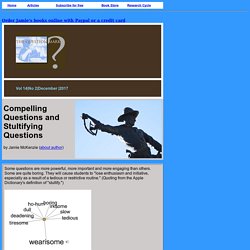
Some are quite boring. They will cause students to "lose enthusiasm and initiative, especially as a result of a tedious or restrictive routine. " (Quoting from the Apple Dictionary's definition of "stultify. ") The failure to know the difference between compelling and stultifying can undermine the success of even the most ambitious and well intended reform effort. Imagine two high school students riding home on the bus.
Bigger is not better. 10 Tips For Launching An Inquiry-Based Classroom. 5 Ways to Help Your Students Become Better Questioners. The humble question is an indispensable tool: the spade that helps us dig for truth, or the flashlight that illuminates surrounding darkness.
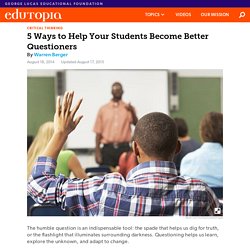
Questioning helps us learn, explore the unknown, and adapt to change. That makes it a most precious “app” today, in a world where everything is changing and so much is unknown. And yet, we don’t seem to value questioning as much as we should. For the most part, in our workplaces as well as our classrooms, it is the answers we reward -- while the questions are barely tolerated. To change that is easier said than done. How to Encourage Questioning 1. Asking a question can be a scary step into the void. 2. 4 Phases of Inquiry-Based Learning: A Guide For Teachers. 4 Phases Of Inquiry-Based Learning: A Guide For Teachers by Terry Heick According to Indiana University Bloomington, Inquiry-based learning is an “instructional model that centers learning on a solving a particular problem or answering a central question.
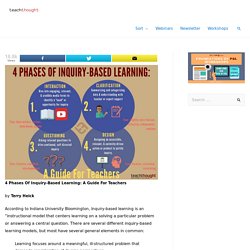
Resources and Downloads to Facilitate Inquiry-Based Learning. A Case for Curiosity: Hear from one educator on the value of asking “why?”
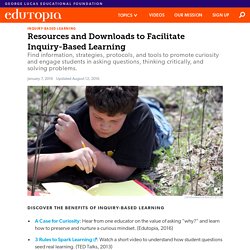
And learn how to preserve and nurture a curious mindset. QFT.